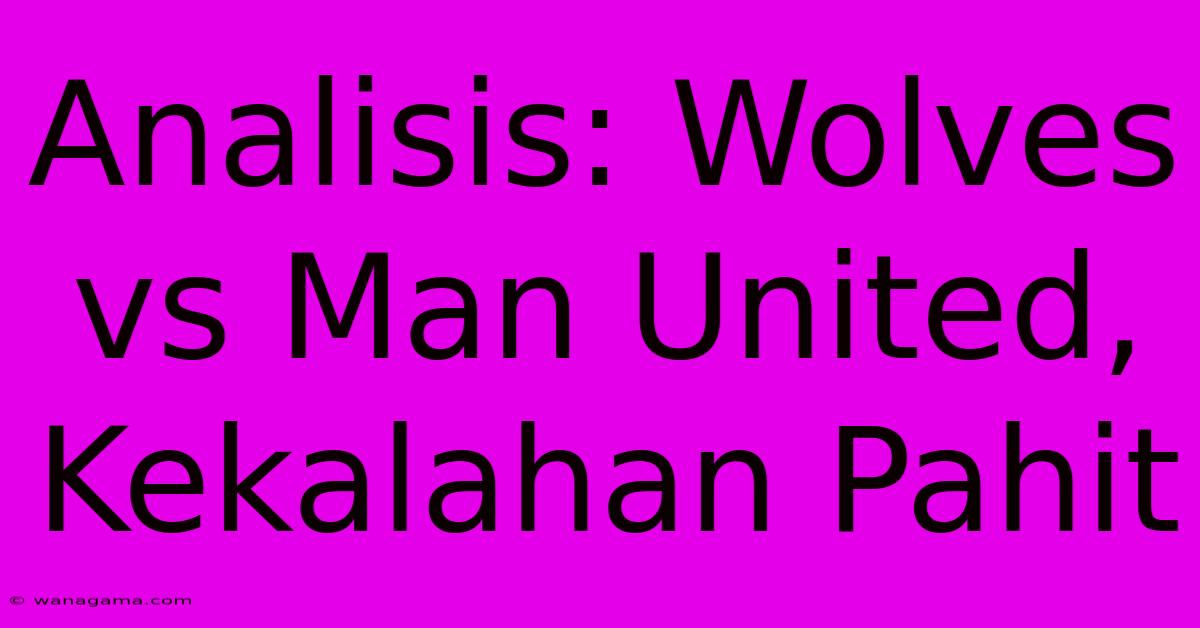Analisis: Wolves Vs Man United, Kekalahan Pahit

Discover more detailed and exciting information on our website. Click the link below to start your adventure: Visit Best Website mr.cleine.com. Don't miss out!
Table of Contents
Analisis: Wolves vs Man United, Kekalahan Pahit
Manchester United's 3-1 defeat at the hands of Wolverhampton Wanderers was a bitter pill to swallow, a performance riddled with errors and lacking the dynamism expected from a club of their stature. This analysis delves deep into the tactical failings, individual performances, and the overall context of this painful loss, examining why United fell so short against a determined Wolves side.
Tactical Flaws: A Blueprint for Defeat
The game exposed several significant tactical weaknesses in Erik ten Hag's approach. While his tactical flexibility has been a hallmark of his tenure, this match saw a rigidity that proved detrimental. The midfield battle, a crucial aspect of any game, was decisively lost. Casemiro, usually a midfield maestro, struggled to impose his usual dominance, often overshadowed by the Wolves' midfield trio. Their ability to win back possession and quickly transition into attack exposed the vulnerability in United's midfield structure.
The high press, a strategy frequently employed by Ten Hag, proved ineffective against Wolves' patient build-up play. Instead of forcing errors, United found themselves consistently bypassed, allowing Wolves to dictate the tempo and build attacks with composure. This tactical miscalculation allowed Wolves to exploit the spaces behind United's defensive line, leading to several dangerous opportunities.
Furthermore, the lack of width in United's attacking play severely hampered their ability to create chances. The wingers often drifted inside, crowding the central areas and making it difficult to penetrate the Wolves' defense. This congestion allowed Wolves to pack the middle, limiting United's creativity and scoring opportunities.
Individual Performances: A Collective Failure
The defeat wasn't solely down to tactical errors; individual performances were also significantly below par. While some players showed glimpses of their potential, several key figures underperformed, contributing to the overall negative outcome.
David de Gea, usually a reliable presence in goal, had a shaky game, his decision-making occasionally questionable. While not directly responsible for all the goals, his performance lacked the authority and decisiveness needed to inspire confidence in the defense.
The defensive line, while generally solid in recent games, struggled to cope with Wolves' attacking prowess. Individual errors led to goals, highlighting a lack of concentration and communication within the back four.
In attack, the lack of a clinical edge was palpable. While United enjoyed periods of possession, their finishing was woefully inadequate. This lack of composure in front of goal, coupled with poor decision-making in the final third, prevented them from capitalizing on opportunities.
Wolves' Tactical Masterclass: Exploiting United's Weaknesses
Wolves, under their manager, executed a near-perfect game plan, meticulously targeting and exploiting the weaknesses in United's game. Their ability to maintain possession, patiently build attacks, and capitalize on United's defensive lapses was testament to their tactical awareness and execution. Their counter-attacking threat was especially effective, leaving United's defense exposed on several occasions.
The Wolves' midfield was particularly impressive, controlling the tempo and winning crucial battles in midfield, disrupting United's rhythm and preventing them from building any meaningful attacking momentum. Their disciplined defensive structure and relentless work rate prevented United from finding any easy route to goal.
The Bigger Picture: A Setback, Not a Catastrophe
While the defeat is undoubtedly a setback, it's crucial to avoid overreaction. It's a single game, and while the performance was disappointing, it doesn't erase the progress made under Ten Hag. The manager now has the opportunity to learn from the mistakes, address the tactical flaws, and reinforce the team's confidence ahead of future challenges.
The psychological impact of this defeat should not be underestimated. The team needs to regain its belief and confidence to bounce back strongly. The manager's ability to effectively address the team's mental state will be critical in determining their response to this setback.
Conclusion: Lessons Learned and the Road Ahead
The Wolves vs Man United game served as a stark reminder that consistency at the highest level is paramount. While the overall season has been positive for United, this loss highlighted some critical areas for improvement. Addressing the midfield dominance issues, improving attacking efficiency, and refining the defensive organization are key priorities.
The road ahead requires a focused approach, involving tactical adjustments, individual improvement, and a renewed commitment to the team's core principles. Ten Hag and his team must learn from this defeat, using it as a catalyst for growth and improvement, to ensure that such a disappointing performance doesn't become a recurring theme. The ability to respond effectively to this setback will be a true test of the team's character and resilience. The analysis clearly shows that while the defeat is a bitter pill, it provides valuable lessons that, when learned and applied effectively, can contribute to future success. The focus now shifts to correcting the identified flaws and ensuring a more consistent and competitive display in upcoming matches. The journey to the top is rarely smooth, and this defeat serves as a crucial learning experience on the path towards achieving Manchester United's aspirations.

Thank you for visiting our website wich cover about Analisis: Wolves Vs Man United, Kekalahan Pahit. We hope the information provided has been useful to you. Feel free to contact us if you have any questions or need further assistance. See you next time and dont miss to bookmark.
Also read the following articles
| Article Title | Date |
|---|---|
| Tragedi Pelakon Baby Driver Meninggal | Dec 27, 2024 |
| Manchester United Tewas Kepada Wolves | Dec 27, 2024 |
| Rakyat India Berduka Cita Manmohan | Dec 27, 2024 |
| Kemenangan Tipis Gol Cunha And Hwang Kad Merah Fernandes | Dec 27, 2024 |
| Kenangan Hudson Meek Pelakon Baby Driver | Dec 27, 2024 |
